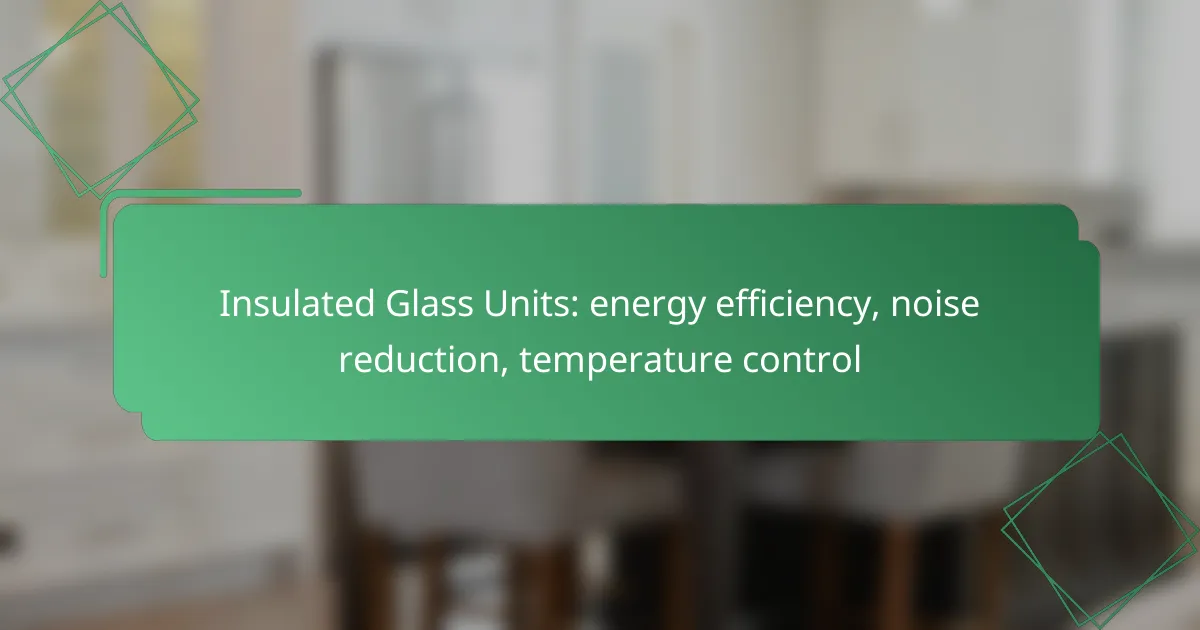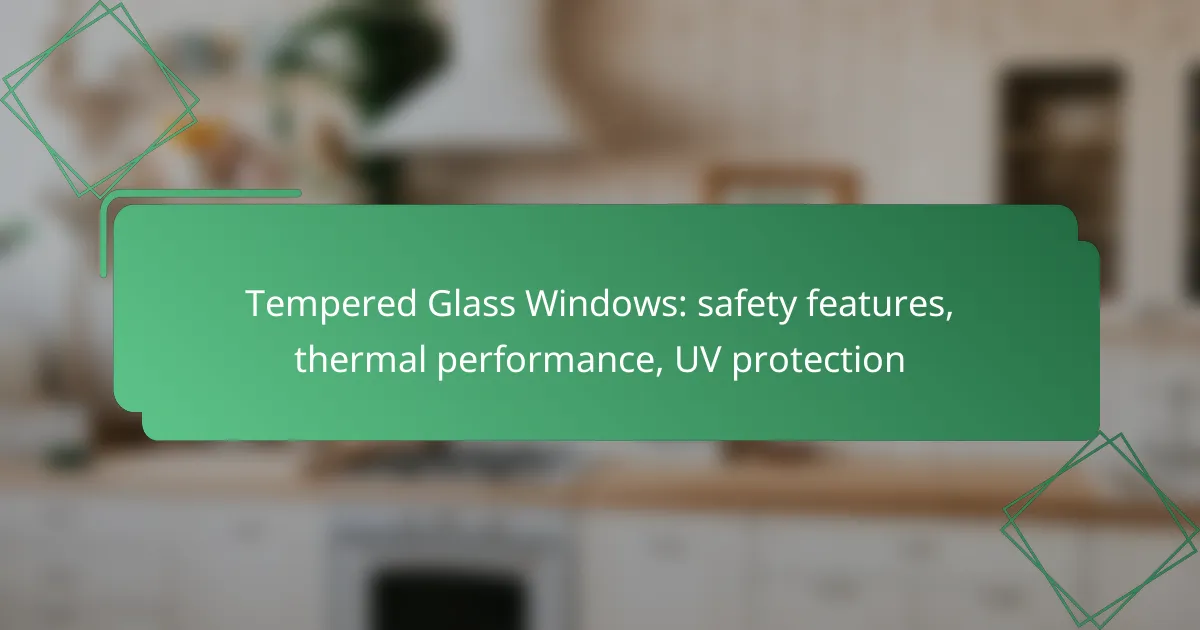Insulated glass units (IGUs) are essential for improving energy efficiency in homes by reducing heat loss and energy consumption. Their multi-pane design, filled with gas, not only helps maintain comfortable indoor temperatures but also significantly minimizes noise pollution, enhancing overall acoustic comfort. By creating an effective thermal barrier, IGUs play a crucial role in temperature control and energy savings.

How do insulated glass units improve energy efficiency in Canada?
Insulated glass units (IGUs) significantly enhance energy efficiency in Canadian homes by minimizing heat loss and reducing energy consumption. These units consist of multiple glass panes separated by a spacer and filled with gas, which creates a thermal barrier that helps maintain indoor temperatures.
Reduced heat transfer
Insulated glass units effectively reduce heat transfer between the interior and exterior of a building. The gas-filled space between the panes, often argon or krypton, acts as an insulator, slowing down the movement of heat. This is particularly beneficial in Canada, where winters can be harsh, as it helps keep homes warm without excessive heating costs.
By using IGUs, homeowners can expect a noticeable decrease in drafts and cold spots, leading to a more comfortable living environment. The reduction in heat transfer can also contribute to a more stable indoor temperature throughout the year.
Lower energy bills
By improving energy efficiency, insulated glass units can lead to lower energy bills. Homeowners may see a reduction in heating and cooling costs by up to 30% when switching from single-pane to double or triple-pane IGUs. This is especially relevant in regions with extreme temperatures, as the savings can add up significantly over time.
Investing in IGUs can provide a quick return on investment through reduced utility expenses, making them a financially sound choice for many Canadian homeowners.
Enhanced insulation properties
Insulated glass units offer enhanced insulation properties compared to traditional single-pane windows. The multiple layers of glass and the insulating gas create a barrier that minimizes heat loss and sound transmission. This not only improves energy efficiency but also contributes to noise reduction, making homes quieter.
For optimal performance, homeowners should consider the U-factor and Solar Heat Gain Coefficient (SHGC) ratings when selecting IGUs. These ratings indicate how well the units insulate and how much solar heat they allow in, helping to choose the best option for specific climate conditions in Canada.

What noise reduction benefits do insulated glass units provide?
Insulated glass units (IGUs) significantly reduce noise pollution by creating a barrier that minimizes sound transmission. Their design typically includes multiple panes of glass separated by a gas-filled space, which effectively dampens external noise and enhances indoor acoustic comfort.
Minimized external noise
Insulated glass units are engineered to limit the amount of external noise that enters a building. The combination of different glass thicknesses and the air or gas layer between the panes helps absorb sound waves, making them particularly effective in urban environments or near busy roads.
For optimal noise reduction, consider IGUs with a Sound Transmission Class (STC) rating of at least 30, which can significantly lower noise levels. Higher STC ratings indicate better performance, so look for units that meet or exceed this threshold for areas with high noise exposure.
Improved acoustic comfort
By minimizing external noise, insulated glass units enhance the overall acoustic comfort within a space. This is especially beneficial in residential settings, where peace and quiet are essential for relaxation and productivity.
To achieve the best results, ensure that IGUs are properly installed and sealed to prevent sound leaks. Regular maintenance, such as checking seals and frames, can also help maintain their noise-reducing capabilities over time.

How do insulated glass units control temperature?
Insulated glass units (IGUs) control temperature by creating a barrier that minimizes heat transfer between the interior and exterior of a building. These units typically consist of two or more panes of glass separated by a space filled with gas, which enhances their thermal performance.
Consistent indoor temperatures
Insulated glass units help maintain consistent indoor temperatures by reducing the amount of heat that enters or escapes a building. This stability is particularly beneficial in climates with extreme temperatures, as it allows for more efficient heating and cooling, leading to lower energy bills.
For example, in colder regions, IGUs can significantly reduce heat loss during winter months, while in warmer areas, they help keep indoor spaces cooler. This consistency can improve overall comfort for occupants.
Reduced temperature fluctuations
By limiting heat transfer, insulated glass units reduce temperature fluctuations inside a building. This means that the indoor environment remains more stable, preventing sudden spikes or drops in temperature that can occur with single-pane windows.
In practical terms, this translates to a more comfortable living or working space, where heating and cooling systems do not have to work as hard to maintain desired temperatures. As a result, the lifespan of HVAC systems can be extended, and maintenance costs may decrease.

What factors should you consider when choosing insulated glass units?
When selecting insulated glass units (IGUs), consider factors such as frame materials, gas fills, and glass coatings, as these elements significantly impact energy efficiency, noise reduction, and temperature control. Making informed choices in these areas can enhance comfort and reduce energy costs.
Frame materials
The frame material of an insulated glass unit plays a crucial role in its overall performance. Common materials include vinyl, aluminum, and wood, each offering different levels of insulation and durability. For example, vinyl frames generally provide better thermal insulation compared to aluminum, which can conduct heat more readily.
When choosing frame materials, consider the climate in your area. In colder regions, frames that minimize thermal bridging, such as vinyl or fiberglass, are often preferable. Additionally, ensure that the frame is compatible with the overall design and aesthetic of your building.
Gas fills
Gas fills inside insulated glass units enhance their energy efficiency by reducing heat transfer. Common gases used include argon and krypton, with argon being the more cost-effective option and krypton providing slightly better insulation in thinner spaces. The choice of gas fill can impact the overall performance of the IGU.
When selecting gas fills, consider the thickness of the airspace between the glass panes. A wider space can accommodate krypton for improved insulation, while argon is effective in standard thicknesses. Ensure that the gas fill is properly sealed to prevent leakage, which can diminish performance over time.
Glass coatings
Glass coatings are essential for enhancing the performance of insulated glass units, particularly in terms of energy efficiency and glare reduction. Low-emissivity (Low-E) coatings can reflect heat back into the room during winter while keeping it out during summer, thus improving temperature control.
When evaluating glass coatings, consider the specific needs of your environment. For instance, in sunny climates, a coating that reduces glare and UV exposure may be beneficial. Always check for the performance ratings of coatings, such as the Solar Heat Gain Coefficient (SHGC) and Visible Transmittance (VT), to ensure they meet your energy efficiency goals.

What are the installation requirements for insulated glass units?
Insulated glass units (IGUs) require careful installation to ensure optimal energy efficiency, noise reduction, and temperature control. Proper installation involves professional expertise, adherence to building codes, and consideration of environmental factors.
Professional installation recommended
Hiring a professional for the installation of insulated glass units is highly advisable. Experts can ensure that the units are sealed correctly, which is crucial for maintaining their thermal performance and preventing moisture buildup. Additionally, trained installers can handle the specific challenges posed by different building types and climates.
Improper installation can lead to issues such as air leaks, condensation, and reduced energy efficiency. Therefore, selecting a qualified contractor with experience in IGU installation is essential to avoid costly repairs and ensure long-term performance.
Building code compliance
Insulated glass units must comply with local building codes, which can vary significantly by region. These codes often dictate the minimum standards for energy efficiency, safety, and structural integrity. Familiarizing yourself with these regulations is crucial before installation.
In many areas, IGUs must meet specific performance criteria, such as U-factor and solar heat gain coefficients. Checking with local authorities or a building inspector can help ensure that your installation meets all necessary requirements, avoiding potential fines or the need for costly rework.

What are the long-term benefits of insulated glass units?
Insulated glass units (IGUs) provide significant long-term benefits, including enhanced energy efficiency, improved noise reduction, and better temperature control. These advantages contribute to lower utility bills, increased comfort, and a more peaceful living environment.
Increased property value
Installing insulated glass units can increase your property’s value by enhancing its energy efficiency and aesthetic appeal. Homebuyers often prioritize energy-efficient features, making properties with IGUs more attractive in the real estate market.
In addition to energy savings, IGUs can improve the overall comfort of a home, which can lead to higher appraisals. Properties with modern, well-insulated windows may command a premium price, often resulting in a return on investment that can be significant over time.










